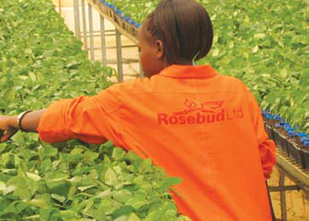 Two of the 18 Ugandan flower growers and exporters participated in the third International Floriculture Trade Expo (IFTEX) which was held at Oshwal Center, in Parklands, Nairobi. The farms are Rose Bud Limited and Mairye Estate.
Two of the 18 Ugandan flower growers and exporters participated in the third International Floriculture Trade Expo (IFTEX) which was held at Oshwal Center, in Parklands, Nairobi. The farms are Rose Bud Limited and Mairye Estate.
Rosebud Limited, located off Entebbe Road, the largest exporter of Sweetheart cut roses from East Africa and largest exporter of roses from Uganda. The farm produces approximately 40% of total Ugandan flower exports. Mairye, which is located in Ntinda Village, Busukuma Subcounty, Wakiso District, produces about half that amount. Sivalingam Ravi Kumar, the Farm Manager, Rose Bud Limited says IFTEX’s growing popularity shows that there is a fundamental shift in the floriculture market towards Africa with Kenya as the hub, something he says Ugandan flower farmers can take advantage of.

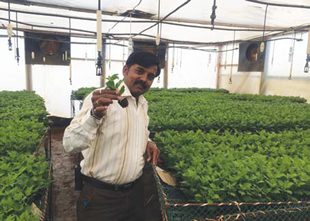 Who is Nirzar Jundre?
Who is Nirzar Jundre?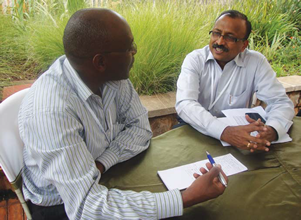 Kenya’s floriculture sub-sector is courting the United States, Russian, Korean and Japanese markets as it seeks to expand from traditional European Union (EU) market.
Kenya’s floriculture sub-sector is courting the United States, Russian, Korean and Japanese markets as it seeks to expand from traditional European Union (EU) market.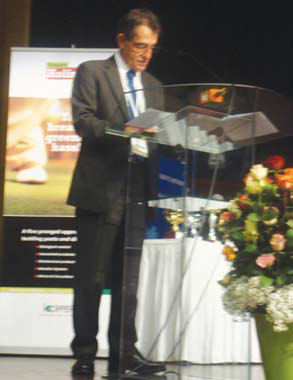 Flower prices over the last six years have grown at only 7 percent whereas costs of production in Kenya have risen by more than 50 percent. This has impacted on the profits and ability to reinvest and expand. Principal amongst these cost increases are power and labour. In addition, the industry has also sought to absorb cost increases through improved efficiencies. This was said by Mr. Richard Fox, Kenya Flower Council Chairman, during the opening of IFTEX 2014.
Flower prices over the last six years have grown at only 7 percent whereas costs of production in Kenya have risen by more than 50 percent. This has impacted on the profits and ability to reinvest and expand. Principal amongst these cost increases are power and labour. In addition, the industry has also sought to absorb cost increases through improved efficiencies. This was said by Mr. Richard Fox, Kenya Flower Council Chairman, during the opening of IFTEX 2014.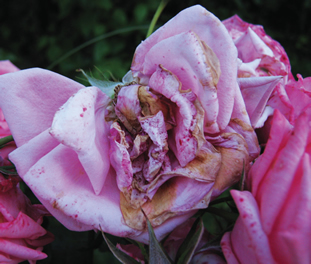 Botrytis is one of the most damaging pathogens with stems, leaves, flowers, fruit and seedlings all being potential victims. Many growers are familiar with the symptoms of Botrytis, but for some, the first encounter with this pathogen results in severe plants losses therefore early detection and control are vital if the disease is to be prevented from rapidly spreading though a crop.
Botrytis is one of the most damaging pathogens with stems, leaves, flowers, fruit and seedlings all being potential victims. Many growers are familiar with the symptoms of Botrytis, but for some, the first encounter with this pathogen results in severe plants losses therefore early detection and control are vital if the disease is to be prevented from rapidly spreading though a crop.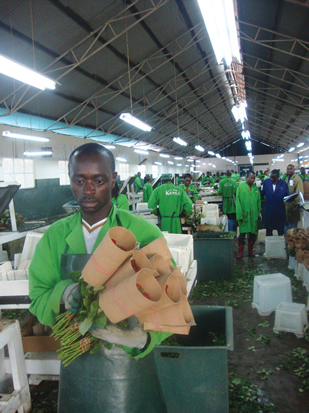 Over 20% of the flowers shipped by growers never reach the final consumer in the export market because they are lost or damaged during the various stages of the distribution chain. Losses can be reduced by ensuring more careful handling, better temperature regulation, attention to phytosanitary requirements and the use of suitable preservation agents. Such measures may be inadequate and even fruitless, however, if not combined with appropriate export packaging.
Over 20% of the flowers shipped by growers never reach the final consumer in the export market because they are lost or damaged during the various stages of the distribution chain. Losses can be reduced by ensuring more careful handling, better temperature regulation, attention to phytosanitary requirements and the use of suitable preservation agents. Such measures may be inadequate and even fruitless, however, if not combined with appropriate export packaging.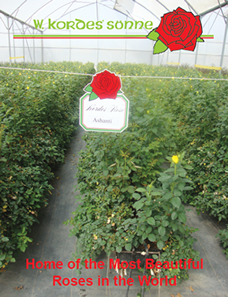 Kenyan roses are ranked among the best in the world and this is usually due to the high quality varieties produced by rose breeders with local branches. One such branch is Kordes Roses East Africa situated in Karen, Nairobi and managed by Mr Bas Smit. This is a branch of W. Kordes Söhne based in Hamburg, Germany, which celebrated its 125th Anniversary two years ago. They have branches located in the cut flower production centres of The Netherlands and Kenya, as well as agents located throughout the world. Kordes’ novelties are tried and grown under local conditions and test marketed in the world’s flower markets.
Kenyan roses are ranked among the best in the world and this is usually due to the high quality varieties produced by rose breeders with local branches. One such branch is Kordes Roses East Africa situated in Karen, Nairobi and managed by Mr Bas Smit. This is a branch of W. Kordes Söhne based in Hamburg, Germany, which celebrated its 125th Anniversary two years ago. They have branches located in the cut flower production centres of The Netherlands and Kenya, as well as agents located throughout the world. Kordes’ novelties are tried and grown under local conditions and test marketed in the world’s flower markets. The GreenCHAINge consortium, made up of trading companies and research institutions, was satisfied with the results of the first sea transport of roses in 2014. The practical test involved transporting both large and small-flowered roses between the port cities of Mombasa and Antwerp. Conditions in the air-conditioned reefer containers (such as the required low temperature and relative humidity) were controlled remotely.
The GreenCHAINge consortium, made up of trading companies and research institutions, was satisfied with the results of the first sea transport of roses in 2014. The practical test involved transporting both large and small-flowered roses between the port cities of Mombasa and Antwerp. Conditions in the air-conditioned reefer containers (such as the required low temperature and relative humidity) were controlled remotely.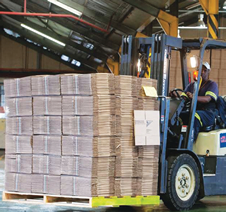 The company provides a total packaging solution from design to delivery, with products ranging from small pizza boxes to large flower cartons.
The company provides a total packaging solution from design to delivery, with products ranging from small pizza boxes to large flower cartons.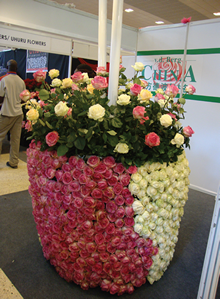 It’s yet another season for horticulture stakeholders and its affiliates. The rare occasion looks ‘glossy green and rosy scented’ but only for the sake of business attributed to the fast growing and highly lucrative floricultural sector.
It’s yet another season for horticulture stakeholders and its affiliates. The rare occasion looks ‘glossy green and rosy scented’ but only for the sake of business attributed to the fast growing and highly lucrative floricultural sector.